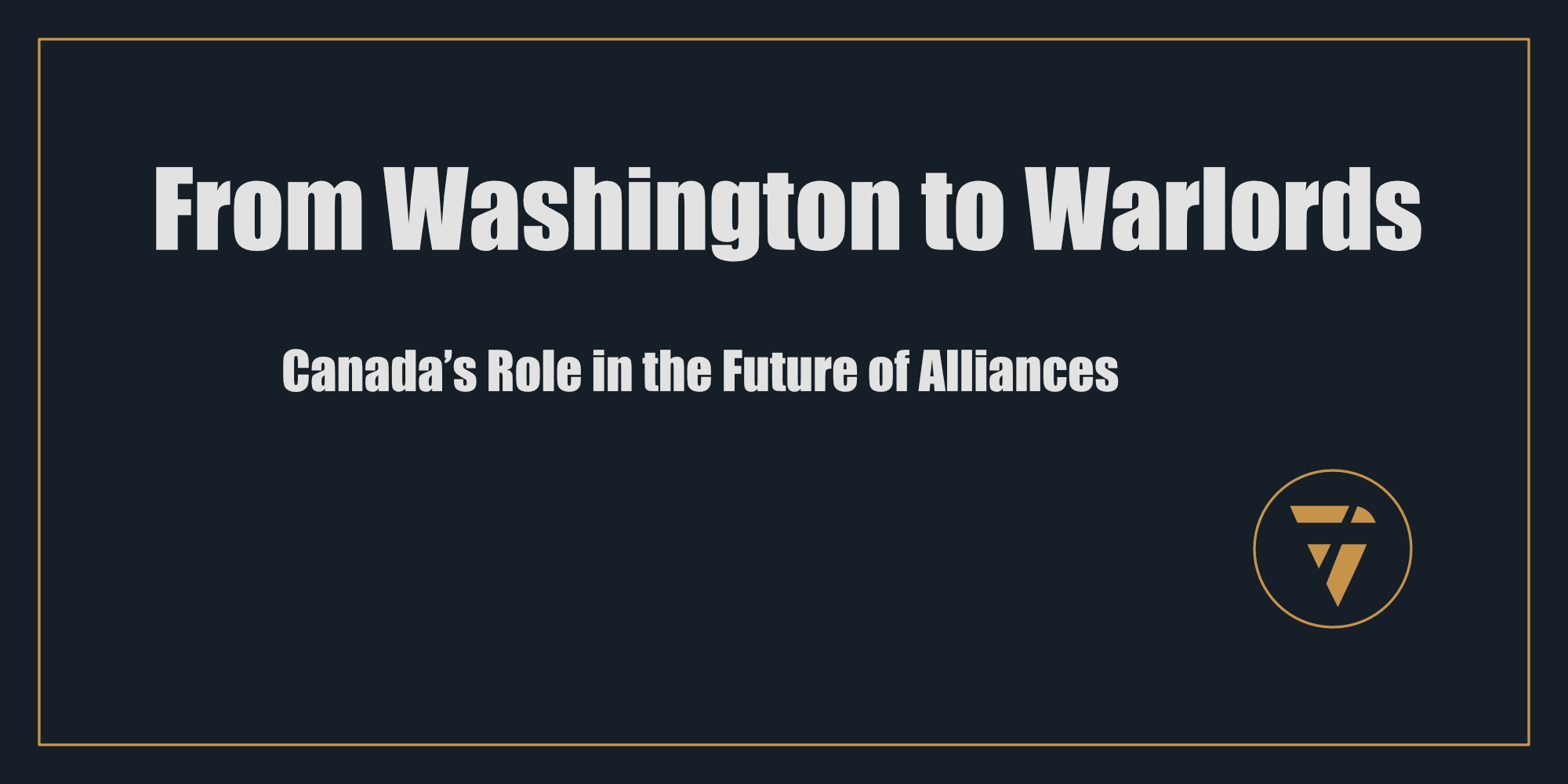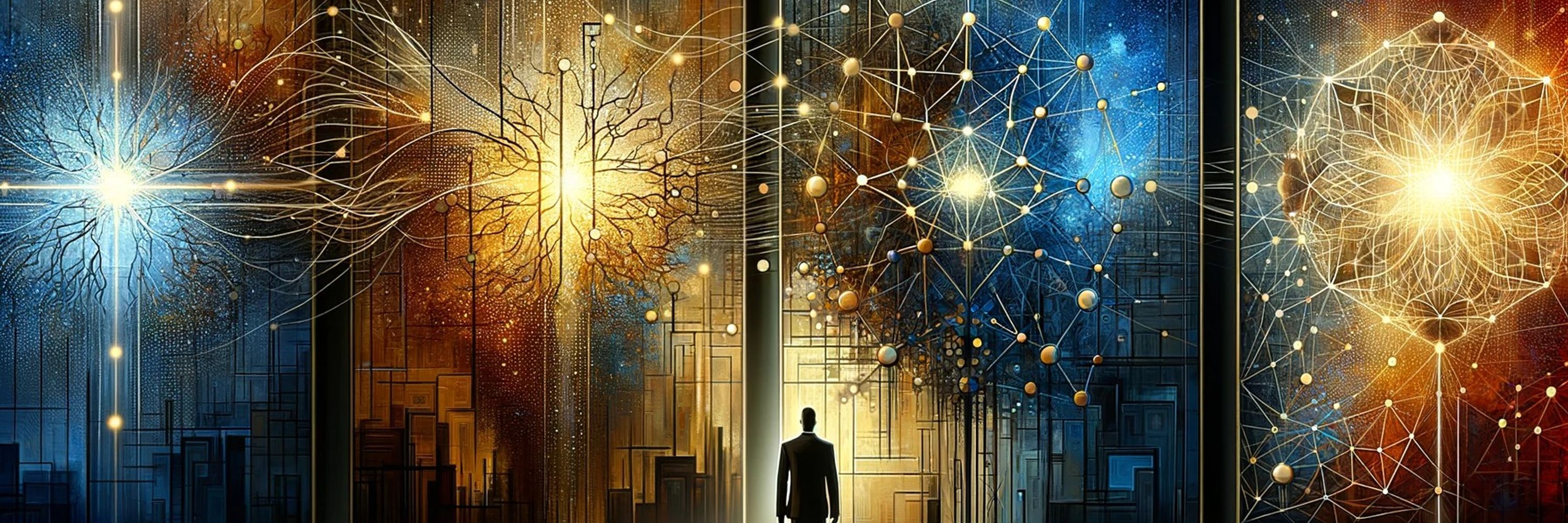From Washington to Warlords

Canada’s Role in the Future of Alliances
The world moves on. For a century, global stability has depended on one assumption: The United States would always be there. It would enforce trade rules, project military power, and provide economic leadership. The alliances of the world—NATO, the G7, the global financial system—were built on this foundation.
That foundation is crumbling.
The U.S. is no longer the reliable anchor it once was. It is internally divided, economically strained, and strategically distracted. It oscillates between aggressive interventionism and isolationist withdrawal, leaving allies uncertain, and adversaries emboldened. Countries that once depended on Washington for security, trade, and leadership can no longer afford to wait for the next election cycle to determine their fate.
The world is reorganizing itself, with or without the United States.
This creates both a crisis and an opportunity. Those who move early—who build new alliances, forge independent economic frameworks, and secure access to critical resources—will shape the next global order.
For Canada, this is the moment to step out of the U.S. shadow and become an interconnector, a global dealmaker, and a trusted bridge between fractured powers.
The question is: Does Canada have the vision and will to seize this opportunity?
The Unraveling: Why Countries Are Seeking Alternatives to Washington
The growing hesitation to rely on the United States is not about ideology, it's about pragmatism. Nations and corporations are moving toward partnerships that bypass Washington’s unpredictability and create stable, long-term frameworks for trade, security, and technological co-operation.
1. The Weaponization of Trade
Washington has turned trade into a geopolitical weapon. The U.S. is using tariffs, sanctions, and economic coercion not against adversaries, but against its own allies. The dollar is still the dominant global currency, but nations increasingly resent their dependence on it.
- The EU is exploring alternative financial systems to bypass U.S. controls.
- The BRICS nations (Brazil, Russia, India, China, South Africa) are developing a non-dollar trade bloc.
- Countries like Saudi Arabia and the UAE are cutting direct deals with China in yuan, not dollars.
2. The Unreliable Security Partner
From Afghanistan to Ukraine, Washington has shown that its security commitments can be abruptly abandoned based on political shifts. U.S. allies are realizing that they must develop independent security frameworks.
- Europe is exploring strategic autonomy, reducing reliance on NATO.
- Japan and South Korea are expanding military ties with Australia and India, rather than relying solely on U.S. support.
- The Middle East is hedging, engaging with both Russia and China while maintaining ties with the West.
3. A Domestic America First Mentality
The "America First" doctrine—embraced across political lines—means U.S. policy is increasingly self-serving. Allies are no longer treated as partners, but as competitors or pawns.
- Washington’s Inflation Reduction Act undercut European industries.
- U.S. domestic policy is disrupting energy security for allies.
- American tech restrictions are forcing allies to choose between U.S. and Chinese supply chains, with no third option.
This leaves a gap—a need for a global player that can act as a stable, independent interconnector.
And that’s where Canada steps in.
Canada’s Opportunity: The Interconnector of a Fracturing World
As the world splits into competing blocs, Canada has the resources, credibility, and positioning to become the indispensable bridge between emerging and established powers:
- It is trusted by the West, but not seen as an aggressor.
- It is geographically positioned between key power centres.
- It has resources that EVERY major player needs—energy, food, water, technology.
If Canada plays its cards right, it can become the critical bridge between the world’s fractured powers.
1. The Energy Broker: Powering Multiple Alliances
Canada is one of the only countries capable of supplying energy to both the West and emerging powers without dependence on U.S. infrastructure.
- Europe needs LNG and rare minerals to break free from Russian and Chinese dependencies.
- India and Southeast Asia need stable, long-term energy partnerships as they scale their economies.
- Japan and South Korea need non-U.S. energy security options.
Potential Alliances:
- A Canada-Europe Energy Corridor, reducing dependence on volatile U.S. policies.
- Arctic energy cooperation with Nordic nations, securing northern supply chains.
- Food and technology partnerships worldwide.
2. A New Trade Network: Strengthening Ties Beyond the U.S.
Canada has long depended on the U.S. for trade, but as Washington turns inward, new markets must take priority.
- India is emerging as a massive trade partner, with an exploding middle class. Political tensions make this less desirable, but has potential. Like the US, India is facing its own crisis, as climate impact forces survival strategies.
- The ASEAN bloc (Vietnam, Indonesia, Thailand) is becoming a new global manufacturing hub.
- The Middle East is shifting from oil export dependence to economic diversification—Canada can be a key partner.
Potential Alliances:
- Expanding the Comprehensive and Progressive Agreement for Trans-Pacific Partnership (CPTPP) to counterbalance China’s influence.
- A direct trade framework with the Gulf states, focusing on food security, energy, and infrastructure.
- A deeper Indo-Pacific partnership, integrating Canada into the fastest-growing global markets.
- Central and South America could be dynamic partners for building a network of functional and supportive economic and social systems.
3. A Neutral Tech and Cybersecurity Hub
The world is being forced to choose between U.S. and Chinese technology ecosystems. Canada can provide a neutral alternative.
- AI and Quantum Computing Leadership: Canada has top-tier AI research hubs—it can build a tech alliance independent of U.S.-China tensions.
- Cybersecurity Co-operation: With growing cyber threats, Canada can position itself as a global security leader outside U.S. and EU bureaucracies.
- Clean Tech and Climate Innovation: With Europe and China both investing heavily in sustainability, Canada can bridge these ecosystems with neutral innovation.
Potential Alliances:
- A Canada-EU Tech Coalition, fostering independent AI and quantum research.
- A cybersecurity pact with Japan, Australia, and Nordic nations, creating a third power bloc.
- A green energy partnership with South America, positioning Canada at the heart of global climate innovation.
4. Military and Security Autonomy
Canada has long relied on NORAD and NATO, but new security partnerships must be explored.
- Strengthening Arctic defence with Nordic allies, countering Russian and Chinese ambitions.
- Expanding security co-operation with the Indo-Pacific, particularly with Japan and Australia.
- A European defence partnership, ensuring strategic autonomy from U.S. military priorities.
Canada Must Move First
The world is not waiting for Washington to get its act together. Countries are already forming new alliances, cutting the U.S. out of the equation.
Canada has two choices:
- Continue as a U.S. dependency, reacting to its decisions and living in its shadow.
- Assert itself as an independent power broker, forging new partnerships, securing global influence, and becoming the world’s trusted interconnector.
The opportunity is here, but it will not last.
The nations that move first will shape the next era of global alliances. Canada has everything it needs to be among them.
The question is, will we act?
Will we ride the tsunami at the top of the curve, or be crushed under the weight of the deluge as it passes over us?
This is what I’m working on. Tell me what you think, I enjoy the conversation! Subscribe and follow the work in real time.
Thanks!
B

In a fractured world, the best position isn’t loyalty, it’s leverage.
Canada has the power.
Do we know how to use it?
PS -






